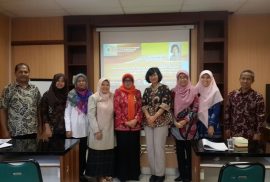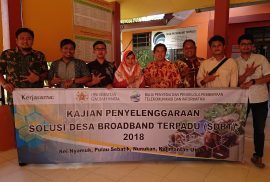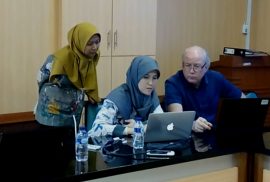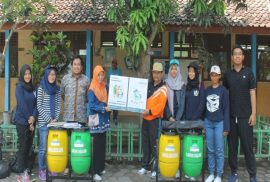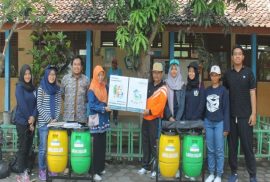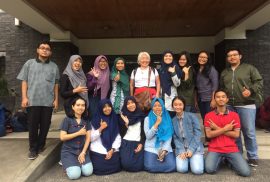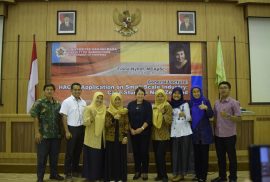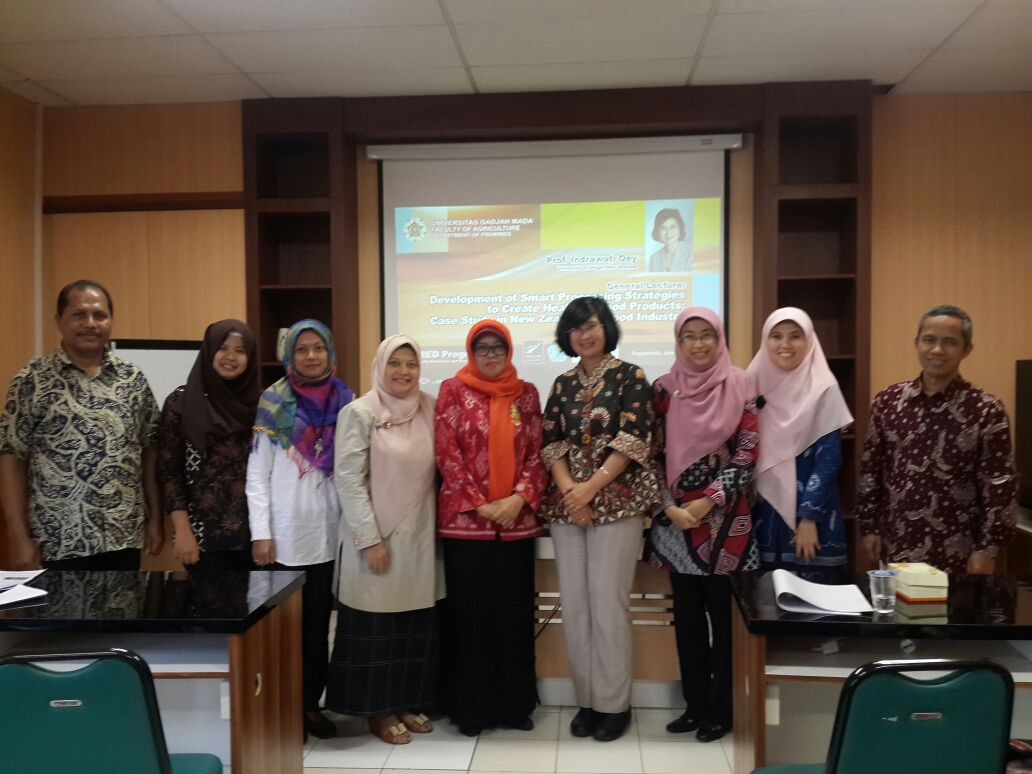 Food processing technology is one of the challenge in delivering the food which is healthy and delicious to be accepted by the consumers. Smart strategies in processing is an important key. Prof. Indrawati Oey, from Otago University, New Zealand, shared her expertise about smart processing strategies in a general lecture held by BFPT on January 23, 2018. The theme of her talk was Development of Smart Processing Strategies to Create Healthier Food Products: Case Study in New Zealand Seafood Industry. Several thermal and non-thermal processing methods were delivered with the case study of the application in the New Zealand’s seafood industries. From this lecture, students gained information of the real condition in application of processing methods in the industries.
Food processing technology is one of the challenge in delivering the food which is healthy and delicious to be accepted by the consumers. Smart strategies in processing is an important key. Prof. Indrawati Oey, from Otago University, New Zealand, shared her expertise about smart processing strategies in a general lecture held by BFPT on January 23, 2018. The theme of her talk was Development of Smart Processing Strategies to Create Healthier Food Products: Case Study in New Zealand Seafood Industry. Several thermal and non-thermal processing methods were delivered with the case study of the application in the New Zealand’s seafood industries. From this lecture, students gained information of the real condition in application of processing methods in the industries.
Indonesia, which is an archipelago, still has many communication problems that must be resolved. One of these problems is the unequal access to internet, especially in 3T areas (underdeveloped, frontier, outermost). The 3T regions, which are directly adjacent to neighboring countries, often have limited access compared to other regions in Indonesia – these areas should have priority facilities to make it easier to get information from the Government of Indonesia. The Integrated Broadband Village Solution Program (SDBT) from the Ministry of Communication and Information Technology in collaboration with UGM, is holding pilot projects in several 3T locations to ensure that the internet network can be reached by the community properly. To maximize the benefits of the internet, the use of information technology is accompanied by piloting in the fields of agriculture and fisheries, so that information relating to these two fields can be directly felt by the community in the 3T area.
Indonesia is one of the main producers of Tuna. The proper post-harvest handling by applying a low temperature during various steps between catch and consumption is crucial. In 2017-2018, Fish Product Technology Study Program (FPT-SP), Department of Fisheries, Faculty of Agriculture UGM made a research collaboration with the University of Tasmania to develop a mathematical model for the prediction of microbial growth in tuna in a function of temperature. This research was financially supported by Ministry of Research, Technology, and Higher Education (KEMENRISTEK-DIKTI) year 2017/2018. Our research partner was Prof. Mark Tamplin, professor of Food Microbiology and Leader on Center for Food Safety, TIA-University of Tasmania (UTAS), Australia. In 23-27 August 2017, Prof. Mark Tamplin visited Yogyakarta. During his visit, he delivered his talk on predictive modeling in food industry as one of the keynote speakers in the 2nd International Symposium on Marine and Fisheries Research held by The Department of Fisheries, Faculty of Agriculture UGM. He also provided a brief workshop on predictive modeling and discussed the possibility of institutional academic collaboration (coututelle) between both universities.
Kegiatan Pengabdian Hibah Education Sustainable Development berjudul “Menumbuhkan Cinta Lingkungan menuju Sistem Proteksi Ekosistem Berkelanjutan” ini diselenggarakan pada bulan Mei-Agustus 2017 di SDN Trisik yang terletak di kawasan pesisir Pantai Trisik. Kegiatan ini bertujuan untuk memberikan pemahaman tentang arti penting pesisir dan pelestariannya kepada anak-anak usia dini di masa sekolah dengan harapan tumbuhnya kesadaran akan manfaat dan potensi yang ada di lingkungan sekitar mereka, dan bagaimana untuk melatih kepedulian lingkungan dan menjaga kelestariannya hingga masa mendatang.
The Education Sustainable Development activity entitled “Growing Love for the Environment towards a Sustainable Ecosystem Protection System” was held in May-August 2017 at Trisik Elementary School which is located in the coastal area of Trisik Beach. This activity aims to provide an understanding of the importance of the coast and its preservation to early childhood in school with the hope of growing awareness of the benefits and potentials that exist in their environment, and how to practice environmental awareness and preserve it into the future.
The global halal food market rises rapidly. This brought an opportunity for fishery products to gain this market share as fish is considered halal. The innovation of research in fisheries product development becomes important in delivering food products to be successful in the market. To broaden student’s knowledge about halal food management, BFBT held a general lecture on Halal Food Management in Fishery Products delivered by Assoc. Prof. Noranizan Mohd. Adzahan (Universiti Putra Malaysia) in 26 July 2017. Her major research interest involves Food Processing and Non-thermal Technology. She has authored and co-authored several national and international publications and also working as a reviewer for reputed professional journals. By joining this general lecture, students had an opportunity to access updated information about halal food management.
Seaweed and fishery products are groups of food with a potential source of probiotics and prebiotics. Research on the gut microbiome has been published widely and reported to be strongly connected to human health by improving host immunity. BFPT held a guest lecture on “Gut Microbiome and Human Health” delivered by Prof. Cindy H. Nakatsu from Purdue University, USA on 10 March 2017. She shared her expertise and research activities on the effect of agricultural-based products on the gut microbiome in children with a controlled diet. Prof Cindy H. Nakatsu is a professor on microbial ecology. Her current research is related to the impact of anthropogenic factors on microbial community structure. She has published many scientific papers and also assigned as a reviewer in reputable journals. This lecture offered a good opportunity to the students to get new insight about microbial community, its role in humans and the environment, and methods for analyzing microbial community structure.
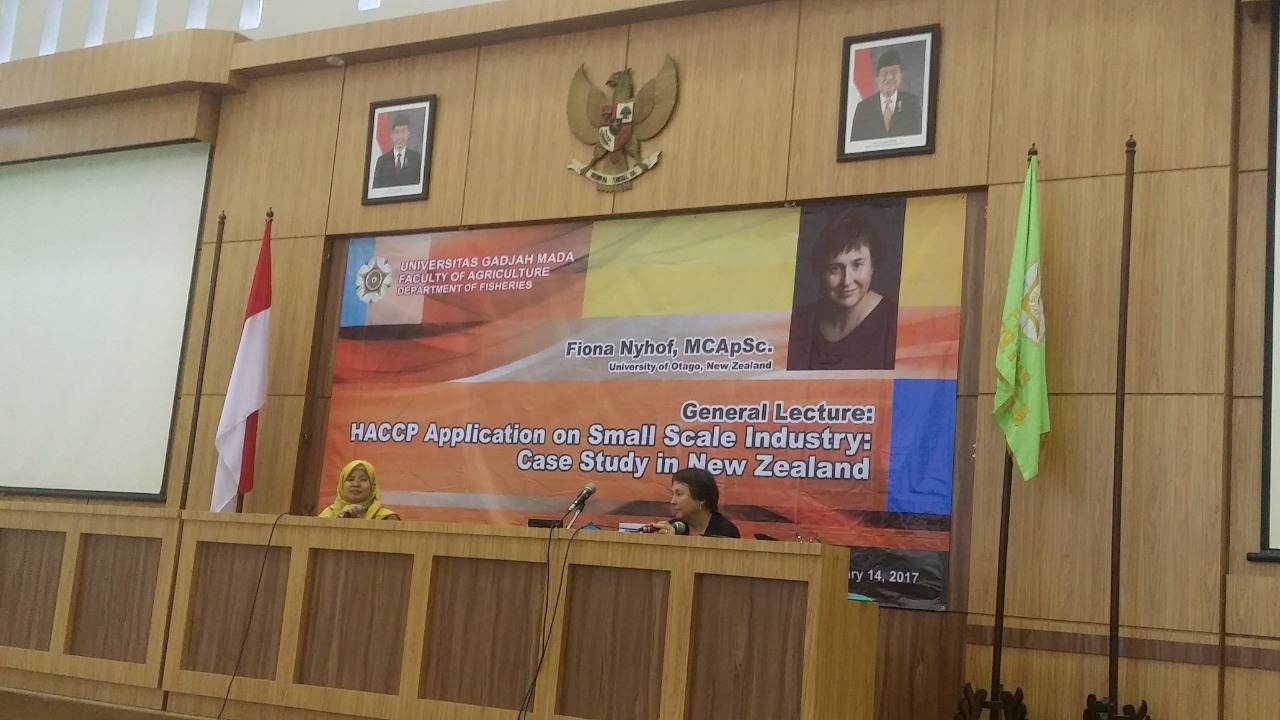 HACCP is the quality management in food industry to assure the safety of products. It has been implemented widely, both in large and small scale food industries all over the world, including fishery products industries. A guest lecturer from University of Otago, New Zealand, Fyona Nyhof, MCApsc., delivered her talk about HACCP Application in Small Scale Industry: Case Study in New Zealand in a general lecture held by BFPT on February 14, 2017. She shared her experiences when she accompanied small scale industries in New Zealand implementing HACCP. The challenge that they faced and the advantage that they gained after the implementation were described in her talk. This lecture gave opportunity for the BFPT students to compare the challenge of HACCP implementation between seafood industries in New Zealand and Indonesia.
HACCP is the quality management in food industry to assure the safety of products. It has been implemented widely, both in large and small scale food industries all over the world, including fishery products industries. A guest lecturer from University of Otago, New Zealand, Fyona Nyhof, MCApsc., delivered her talk about HACCP Application in Small Scale Industry: Case Study in New Zealand in a general lecture held by BFPT on February 14, 2017. She shared her experiences when she accompanied small scale industries in New Zealand implementing HACCP. The challenge that they faced and the advantage that they gained after the implementation were described in her talk. This lecture gave opportunity for the BFPT students to compare the challenge of HACCP implementation between seafood industries in New Zealand and Indonesia.
Indun Dewi Puspita, Ari Wardani, RR. Oki Arum Puspitasari, Prihati Sih Nugraheni, Mgs. Muhammad Prima Putra, Sri Pudjiraharti, and Ustadi
Abstract
The objectives of this research were to isolate chitinolytic bacteria from shrimp rusip (an Indonesian traditional fermented shrimp product), identify bacterial isolates showing high chitinolytic activity, and determine the chitinolytic activity of these isolates. There were 44 chitinolytic bacteria isolated from shrimp rusip: 39 isolates of Gram-positive bacteria and 5 isolates of Gram-negative bacteria. The quantitative method we used to evaluate chitin-degrading enzyme activity measured the amount of N-acetylglucosamine produced from the reaction of crude enzyme and colloidal chitin. Seven isolates showing highest chitinolytic activity were Bacillus cereus (KKT 1, KKT 14, and KKT 19), Bacillus thuringiensis (KKT 6), Enterobacter cloacae (LCK 20), Pseudomonas stutzeri (LCK 17), and Stenotrophomonas maltophilia (THK1). The highest chitinolytic activity showed by KKT 1, KKT 6, KKT 14, KKT 19, and THK 1 were 0.0016 U/mL (at 72 hours); 0.0018 U/mL (at 48 hours); 0.0019 U/mL (at 48 hours); 0.0033 U/mL (at 48 hours); and 0.0032 U/mL (at 24 hours), respectively. Keywords: chitinase activity, chitinolytic bacteria, shrimp rusip Biodiversitas 18: 1275-1281. Full textPawon Gendis Women Farmers Group is one of the women farmer groups in Banjarharjo Village, Kalibawang District, Kulon Progo Regency Yogyakarta which was founded in 2013 with the main objective to process local food sources to support food security in Kulon Progo Regency. Together with 42 members, Pawon Gendis has succeeded in having the superior product ‘Manihot’ made from cassava with a PIRT (house hold processing certification) and halal distribution permit from LPOM MUI. Apart from agricultural products, fish based food are also easy to find in Banjarharjo – but this has not been utilized optimally. For this reason, through guidance provided by the Department of Fisheries, UGM Faculty of Agriculture, Pawon Gendis has begun to produce fish products in a good and zero waste way, so as to produce quality processed fish products to maximize the goals of women farmer groups that are able to support food security, especially in regencies. Kulon Progo

